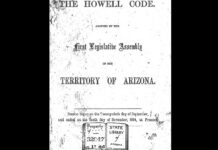The Sedona Police Department is getting a much-needed upgrade that will help reduce the amount of time officers spend on record-keeping and increase the time they can spend on patrol.
To reduce its paperwork burden, the SPD recently obtained a grant from the Arizona Governor’s Office of Highway Safety in the amount of $18,857.13 to purchase Traffic and Criminal Software, stylized as TraCS.

The software will allow officers to process tickets and accident reports electronically, minimizing the amount of paperwork officers need to complete.
“It will decrease the amount of time it takes an officer to write a traffic ticket or collect accident report information. The less time officers and motorists spend parked along busy roads, the less chance of accident, injury or traffic disruption,” SPD Lt. Karl Waak stated.

Getting officers back on the street has been a cornerstone of community-oriented policing, a style of policing that focuses on community engagement and has been shown to be effective in reducing crime in studies conducted in Kansas City and New York City.
Community-oriented policing requires that patrol officers remain in a “beat” during their shift; a beat is a small area to which an officer is assigned, within which they are responsible for patrolling and providing community service. The objective is for patrol officers to get to know residents and business owners and deter crime through their presence. However, when officers make an arrest, or issue a ticket, department policy generally requires that specific forms be filled out and turned in to comply with state and federal law.

At small agencies, officers are typically required to fill out paper copies of forms or complete handwritten reports that are then turned in to a records clerk to be filed with the appropriate department or agency. All of this happens at the police department; which also provides a safe place to write reports.
On average, a call that will only occupy an officer for 30 minutes without any arrests will require between two and four hours of paperwork. As a result, officers either have to leave their beats for substantial amounts of time to comply with policy or cut corners when it comes to doing their paperwork.
Advances in technology have helped bridge this gap. Ticketing and accident documenting software will reduce the time that paperwork for each case takes by a few hours on average, depending on the proficiency the officer has with the program. The program is also intended to help with DUI reporting that can take upwards of four hours to complete.

“Using the system will reduce the time officers spend on paperwork and will help clear them from traffic stops and accident scenes in less time which will increase their availability,” Waak said.
Many officers will drop a case or “no-case” a call that should be documented in the effort to avoid the mountain of paperwork it will impose on them. Often, officers are encouraged by superiors and administrators to neglect or hurry their paperwork so they can be out on the street, which causes further problems when a citizen needs to obtain public records. Easing the burden of paperwork has the potential to increase the quality of documentation within the SPD while also increasing officer availability.
“We’re excited to launch a more efficient ticket writing and reporting process, and we’re grateful to have the Arizona Governor’s Office of Highway Safety’s support,” Waak said.
The program will roll out when all the equipment is on hand and officers have been trained on the software.




















